Scandals, strike threats and cutbacks - a Welsh rugby season like no other
- Published
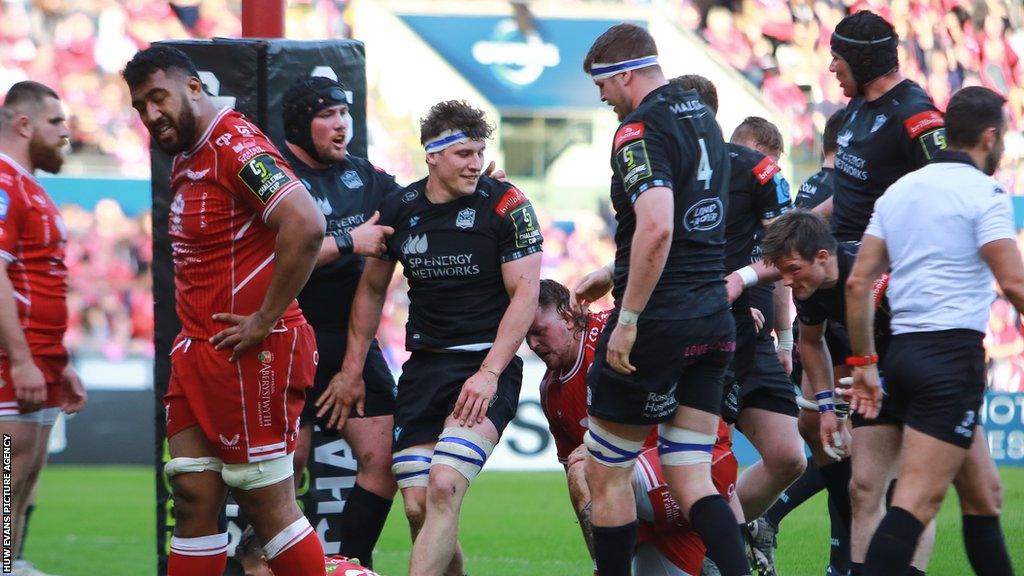
Scarlets lost to Glasgow in the European Challenge Cup semi-final to end the season for the Welsh regions
Thankfully it is over. The end of April is early for the conclusion of the professional season in Welsh rugby, but many would argue it is not a moment too soon to see the back of this calamitous campaign.
Scarlets bowing out of the Challenge Cup semi-finals against Glasgow represents the completion of what has arguably been the most turbulent season of the professional era in Wales.
The events of 2003 could rival this term, with a Six Nations clean sweep of defeats supplemented by the introduction of regional rugby.
Like 20 years ago, mediocrity on the field has been compounded by chaos and controversy off it. The 2022-23 season will live long in the memory - but for all the wrong reasons.
Over the last eight months, just when you thought things could not get any worse, something else seemed to pop up in a quite depressing, soap-opera style.
There have been far more lowlights than highlights over the last nine months when you look at the men's professional game, with the improvement of the women's national side probably the only positive for Welsh rugby.
A Welsh Rugby Union (WRU) sexism scandal, the chief executive resigning, coaches being sacked or suspended, Wales players threatening to strike over contractual chaos, a struggling national team and continued regional failures. Enough drama for you?
All of the above has been played out against a grim financial backdrop with the four professional sides heading into a period of serious belt-tightening.
The danger is controversy could be replaced by apathy towards the Welsh game among players and supporters.
Sexism scandal, strike threats
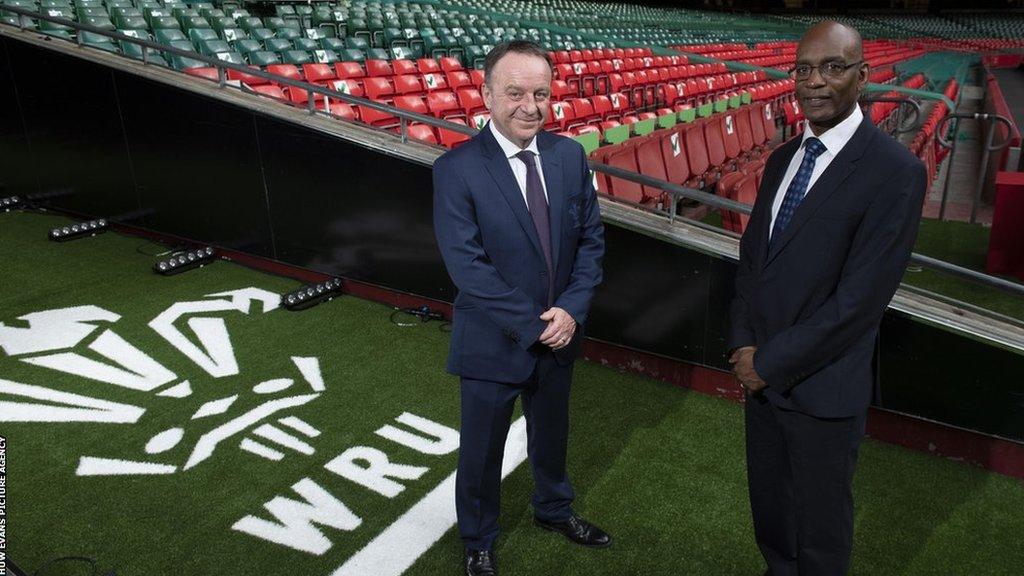
Steve Phillips (L) appointed Nigel Walker as Welsh Rugby Union performance director in 2021
In January, the WRU found itself embroiled in a scandal following accusations of sexism and misogyny made in a BBC Wales investigates programme.
It ultimately led to the resignation of former chief executive Steve Phillips, with the governing body arranging an independent investigation into the organisation's culture which remains ongoing.
Nigel Walker stepped up from his performance manager role to become the interim chief executive and, along with chair Ieuan Evans, has sought to start repairing the WRU's reputation.
They apologised repeatedly before embarking on major governance change by calling an extraordinary general meeting (EGM).
The clubs agreed to allow the WRU to select more independent board members to create a more modern and diverse organisation.
It is a starting point, with a permanent chief executive and independent chair to be selected.
While January was dominated by the sexism scandal, February saw the Wales squad threatening strike action for the Six Nations match against England.
Things came to a head following the financial and contractual carnage which had dragged on for almost a year.
The WRU and regions had failed to agree a new financial deal that would allow contracts to be offered to players.
It was the senior squad who were threatening to strike but the action was also on behalf of the regional players, who were uncertain about their futures with only a few months left on current contracts.
'We need to be at the top, not a laughing stock' - Wales captain Owens
The threat of strike action was averted three days before the Wales versus England fixture when Walker and Professional Rugby Board (PRB) chair Malcolm Wall addressed the players at the senior squad's training base in the Vale of Glamorgan.
Who can forget the remarkable scenes of Wales captain Ken Owens standing alongside Walker and calling Welsh rugby the laughing stock of world rugby? It still seems surreal.
Pivac out, Gatland back
The success of 'Team Wales' over the last 18 years has often papered over the cracks of the Welsh rugby system. Now the national side is struggling, it can no longer do that.
In most seasons, the return of Warren Gatland as Wales head coach would have been the headline act.
The writing was on the wall for Wayne Pivac after a disastrous home defeat against Georgia last November, just eight months after his Wales side had lost to Italy in Cardiff.
Three wins and nine defeats in 2022 resulted in Pivac losing his job and being replaced by fellow New Zealander Gatland, who had left the role in 2019 after his first initial 12-year stint.
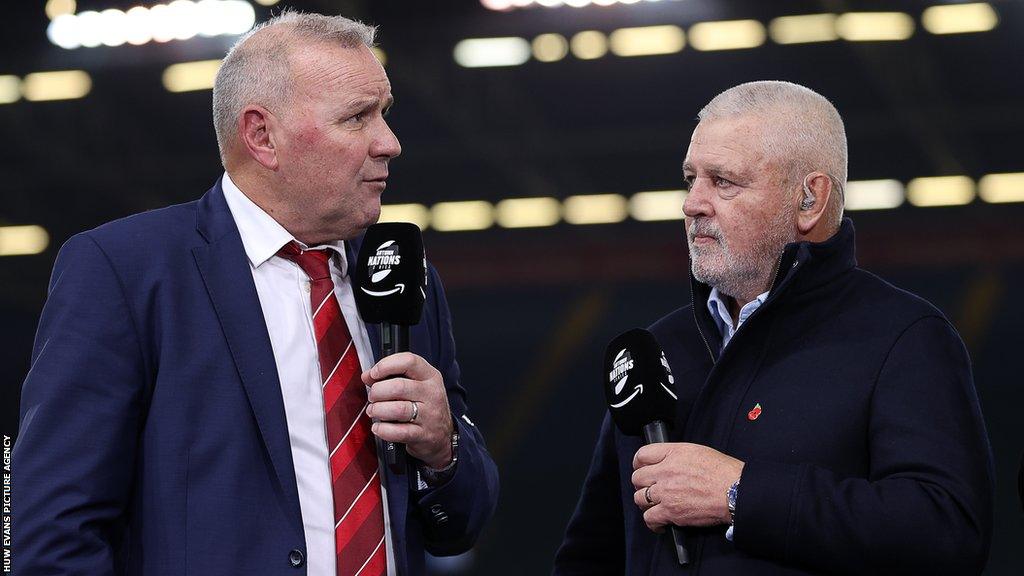
Wayne Pivac (L) replaced Warren Gatland as Wales head coach after the 2019 World Cup
Any hopes of a Gatland bounce soon vanished with four defeats in five matches, including a record loss against Scotland, with Wales recording a sole Six Nations victory over Italy. The fifth-place finish in the Six Nations mirrored Pivac's result of a year earlier.
So only two wins in nine internationals in the season tells its own story as Wales have slipped to ninth in the world rankings.
Gatland will turn his attention to the World Cup in France, which starts in September, as he aims to lead Wales out of a group featuring Australia, Fiji, Georgia and Portugal. He will have more time with his squad and expects better results.
Continued regional struggles
Cardiff suspended director of rugby Dai Young a day before the final game of the season without giving an official reason, stating only that he was not in charge at Judgement Day because of "unforeseen circumstances".
Earlier in the season there was the Dean Ryan saga at Dragons, as the director of rugby disappeared after critical comments about his players' performance in the season-opening defeat against Edinburgh. The Gwent region eventually confirmed his departure.
Normally these sagas might be considered scandals. In this calamitous campaign, they are footnotes.
On the field, for the second successive season, all four Welsh sides finished in the bottom half of the United Rugby Championship (URC) table and failed to reach the end-of-season play-offs.
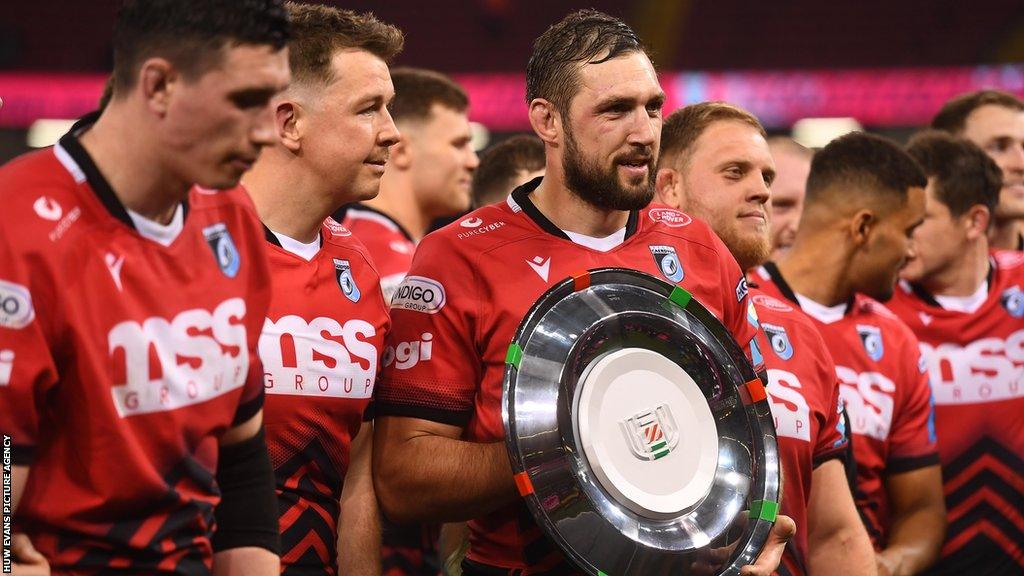
Cardiff captain Josh Turnbull with the URC Welsh shield as the region are rewarded for finishing as the highest Welsh side in the tournament
Cardiff were the top Welsh side with a 10th-place finish out of 16 sides, with Ospreys 13th, Scarlets 14th and Dragons 15th.
The four regions played 48 league matches against teams from Scotland, Ireland, South Africa and Italy and won just 13.
There were some bright moments from Ospreys in the Heineken Champions Cup - with a successful double over French champions Montpellier and a win at England's league winners Leicester, before they bowed out in the last 16 against Saracens - and there was Scarlets' European Challenge Cup run.
Those successes, however, have been exceptions rather than the rule. It will not get any easier as the cash-strapped regions continue to battle to survive.
A new deal between the WRU and regions was agreed at the end of March so contracts could be offered and some certainty provided, but the financial figures still make grim reading for the regions.
There will be a salary cap of £5.2m for the 2023-24 season, falling to £4.5m for the following campaign.
That is not exactly a level playing field when competing against teams from other nations in the URC, plus English and French sides in European competition.
Squad sizes will be slashed to between 34 and 36 and there has been an exodus of players, with more than 50 across the regions departing.
Wales internationals Aaron Shingler, Josh Navidi and Kristian Dacey have announced their retirements, with Rhys Priestland expected to follow suit.
Ross Moriarty, Will Rowlands, Joe Hawkins, Dillon Lewis and Jarrod Evans have left or are leaving for clubs in England and France, with Lloyd Williams and Sam Davies in line for similar moves.
Ospreys trio Rhys Webb, Gareth Anscombe and Dan Lydiate, and Scarlets pair Leigh Halfpenny and Rhys Patchell are exploring other avenues.
Influential non-Welsh players such as Sione Kalamafoni, Tomas Lezana, Rey Lee-Lo and Stephen Myler have also gone. There are very few new signings coming in, especially any of note.
Cardiff will be Wales' representative in the Champions Cup next season and have just seen 16 players leave, including many internationals.
So do not be surprised if things deteriorate before they improve as the number of Wales professional sides is kept at four.
Club concerns
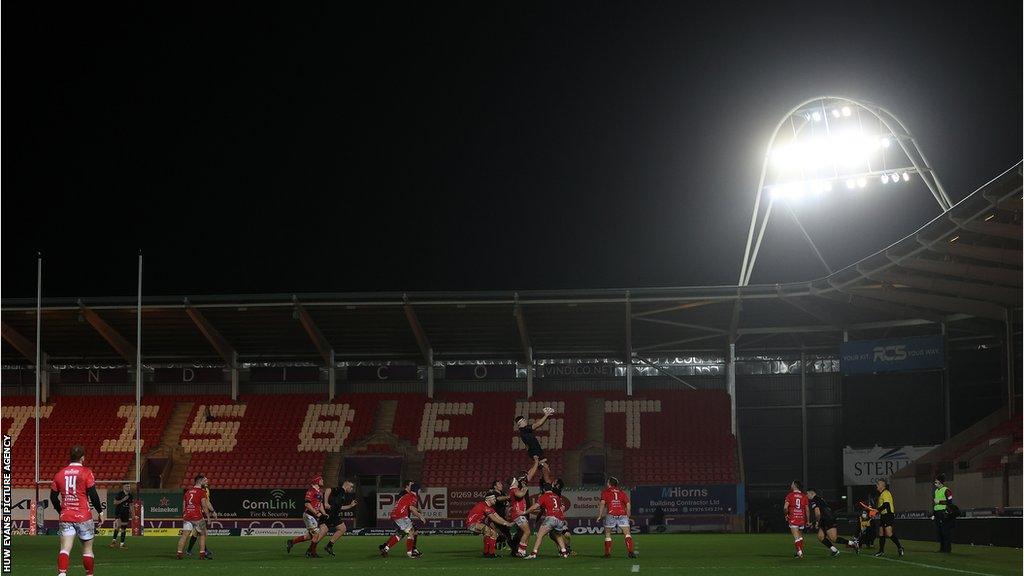
Llanelli have played their Welsh Premiership club games at Parc y Scarlets
There are other issues within the Welsh game. Looking at the conveyor belt of players coming through and results in age-grade games make grim reading, with Wales Under-20s suffering a clean sweep of defeats and propping up the Six Nations table.
The semi-professional set-up conundrum has again not been resolved, with talk now of a new eight-team tournament to try to bridge the gap to the regional game.
Llanelli's club side have pulled out of the existing Welsh Premiership for next season and been unable to raise a team for this season's final games.
The WRU has had to deal with a number of matches being called off this year with clubs not being able to raise sides and a congested end to the season.
The governing body deserves credit having hosting a festival of finals at Principality Stadium which allowed thousands of players to experience performing at Welsh rugby's home.
The serious concussion issue will continue to affect the professional and community games. There is the financial element of the threat of legal cases, with past players suffering ill-health in later life, while rugby also has to try to persuade the new generation rugby is safe to play.
In contrast to the doom and gloom, the newly professional Wales women's side continue on an upward trajectory having improved their Six Nations performances, while participation levels and the game's structure are looking more healthy. An example of what can be achieved with investment and strategy.
When Cardiff captain Josh Turnbull asked PRB chair Wall on the BBC Wales Scrum V programme to explain what the long-term strategy for Welsh regional rugby was, some felt he struggled to give a definitive answer. This will be a good place to start for the potential new-look WRU.
This autumn's World Cup looms on the horizon and the Welsh nation will be united again for that. It will be Gatland's fourth tournament in charge and he has never failed to get Wales out of the group stages.
But any perceived success or improvement will not mask the reality that cracks in the Welsh game run deep.
Failure to appreciate the depth of the sport's problems in Wales has been a mistake made before. For the survival and future prosperity of the Welsh game, it cannot happen again.